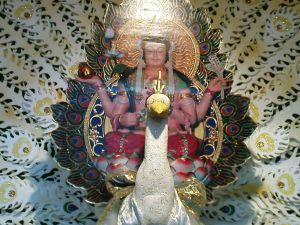Difference between revisions of "The Six Vajra Lines Supplication"
| Line 66: | Line 66: | ||
[[Category:Prayers]] | [[Category:Prayers]] | ||
[[Category:Guru Rinpoche Prayers]] | [[Category:Guru Rinpoche Prayers]] | ||
| − | + | [[Category:Barchey Künsel Cycle]] | |
[[https://lhaseylotsawa.org/library/six-vajra-lines-supplication]] | [[https://lhaseylotsawa.org/library/six-vajra-lines-supplication]] | ||
Latest revision as of 07:43, 23 September 2022
༄༅། །རྡོ་རྗེའི་ཚིག་རྐང་དྲུག་གི་གསོལ་འདེབས། །
The Six Vajra Lines Supplication
A revelation by Chokgyur Dechen Lingpa
དུས་གསུམ་སངས་རྒྱས་གུ་རུ་རིན་པོ་ཆེ༔
Buddha of the three times, Guru Rinpoché,༔
དངོས་གྲུབ་ཀུན་བདག་བདེ་བ་ཆེན་པོའི་ཞབས༔
ngödrup kün dak dewa chenpö zhap༔
lord of all siddhis, Great Bliss,༔
བར་ཆད་ཀུན་སེལ་བདུད་འདུལ་དྲག་པོ་རྩལ༔
barché kün sel düdül drakpo tsel༔
dispeller of all obstacles, Wrathful Tamer of Demons,༔
གསོལ་བ་འདེབས་སོ་བྱིན་གྱིས་བརླབ་ཏུ་གསོལ༔
sölwa depso jin gyi lap tu söl༔
I supplicate you, bestow your blessings!༔
ཕྱི་ནང་གསང་བའི་བར་ཆད་ཞི་བ་དང༌༔
chi nang sangwé barché zhiwa dang༔
Pacify the outer, inner, and secret obstacles༔
བསམ་པ་ལྷུན་གྱིས་འགྲུབ་པར་བྱིན་གྱིས་རློབས༔
sampa lhün gyi drupar jin gyi lop༔
and spontaneously fulfill all wishes!༔
ཞེས་གཏེར་ཆེན་མཆོག་གྱུར་བདེ་ཆེན་གླིང་པས་སེང་ཆེན་གནམ་བྲག་གི་གཡས་ཟུར་བྲག་རི་རིན་ཆེན་བརྩེགས་པ་ནས་སྤྱན་དྲངས་པའི་དུས་བབས་ཀྱི་གསོལ་འདེབས་འདི་ཉིད་བྱིན་རླབས་ཤིན་ཏུ་ཆེ་བས་ཀུན་གྱིས་ཁ་ཏོན་དུ་གཅེས་པར་ཟུངས་ཤིག། །།
Discovered by the great treasure revealer Chokgyur Dechen Lingpa, from the right-hand side of the Sengchen Namdrak rock on Mount Rinchen Tsekpa, “The Pile of Jewels.” Because the blessing of this prayer, intended for this present time, is so immense, it should be treasured by all as their daily practice.
Rangjung Yeshe & Lhasey Lotsawa Translations, 2019 (trans. Erik Pema Kunsang, checked against the Tibetan and edited by Oriane Sherap Lhamo), with the exception of the colophon which was translated by Rigpa Translations.
Source
[[1]]
